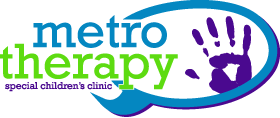
Developmental Milestones for Your Toddler’s Third Year
This guide breaks down the key developmental milestones your toddler should reach between 30 months and 3 years old. Understanding these milestones is the first step to actively supporting your toddler’s growth and setting them up for school readiness. If you have any questions or concerns, feel free to reach out to the Metro Therapy team at (763) 450-9400 today and we’ll be happy to help.
Development at 30 Months Old
By the time your baby is about 30 months old, they should achieve the following new skills:
Speech & Language
Starts using action words in sentences, like “dog run”
Names things when you point and ask, “What is that?”
Starts using pronouns like “I” and “me”
Cognitive
Plays pretend with objects
Follows simple two-step instructions like “Get the doll, and bring it to me”
Knows one or two colors
Solves simple problems like using a chair to reach something
Movement
Able to turn doorknobs or unscrew lids
Jumps with both feet off the ground
Takes clothes off by themselves
Turns the pages in a book when you read together
Social & Emotional
Plays next to other toddlers and may play with them
Shows off their skills to you and wants you to watch
Follows simple routines with you like cleaning up toys
Feeding
Eats a wider variety of foods
Uses utensils more successfully
Development at 3 Years Old
By the time your toddler is about 3 years old, they should achieve the following new skills:
Speech & Language
Starts asking questions with “who,” “what,” “where,” or “why”
Says what is happening in a picture book
Knows their first name
Speaks clearly enough for others to understand most of the time
Cognitive
Shows caution, like avoiding a hot stove when you warn them it’s hot
Draws simple shapes when you show them how
Movement
Puts on clothes without help, like a jacket or slip-on shoes
Can string large beads together
Social & Emotional
Sees when other children are around and wants to play with them
Calms down in 10 minutes after you leave them at daycare or with a babysitter
Feeding
Able to chew food with their mouth closed
Eats and drinks without making big messes
Frequently Asked Questions
-
By age three, toddlers often use simple sentences and average vocabulary size is around 1,000 words. They also use pronouns and ask lots of questions. If your toddler is using limited language or is very difficulty to understand or you are concerned about stuttering, you can always schedule a screening with our speech-language pathologists.
-
Many toddlers aren’t ready to start potty training until they’re about three years old, though some can start earlier. Remember to be encouraging, praise their efforts to use the potty, and don’t try to force them.
-
Yes, playing pretend and even having imaginary friends is a normal part of development. Not only is it fun for your child, but it helps them practice social skills like communication and taking turns.
-
You can play with your toddler by doing simple puzzles, matching games, and even little scavenger hunts (like asking them to find familiar objects in the house). You can also talk through problems with your child to encourage critical thinking. For example, if you can’t reach something and say, “How can I reach that thing? I know, I’ll grab a stool.” Or if your child has a problem, ask them how they can solve it and give suggestions if they need.
-
Most children are starting to learn the alphabet between ages 2 and 3 and may be able to recognize half the letters by their third birthday. Help your child by singing the ABC song or playing games that use letters, like matching games.
-
Picky eating can be a natural expression of preference, or it can be a symptom of trouble with chewing or swallowing specific textures of food. It can also be related to sensory processing, or your child’s ability to manage the feelings they get from different sensations like touch or flavor. If your child seems to be an extremely picky eater, or if they get upset or have tantrums at mealtimes, you should schedule a screening with our expert feeding therapists to figure out what’s happening and help them get the support they need to eat nutritious foods.
-
Speech development can vary, but if you're concerned about your child's language skills, you should schedule a screening with our speech-language pathologists. Early intervention is vital to ensure your child reaches their speech and language milestones for success in school and life.
-
Some children have more shy or reserved personalities, which is totally fine. But if your child doesn’t enjoy playing with other children or seems to really struggle in social situations, you should speak with their pediatrician or schedule a screening with our occupational therapists. Early intervention can make a world of difference and help your child be more comfortable in social situations.
Schedule a Free Screening
At Metro Therapy in Fridley, MN, we celebrate each milestone your toddler achieves. If you have any concerns about their development, or if you just want to ensure your child is achieving their skills, our expert pediatric therapists are here to support you. Schedule a free screening and help your toddler be the very best they can be.

